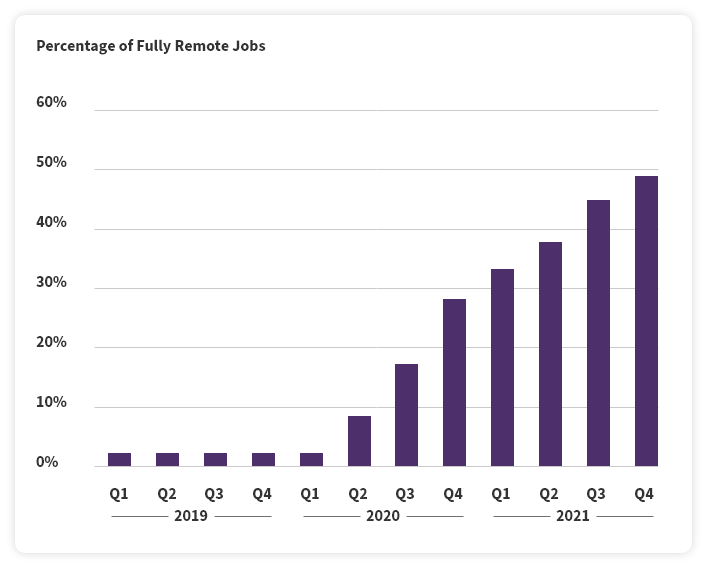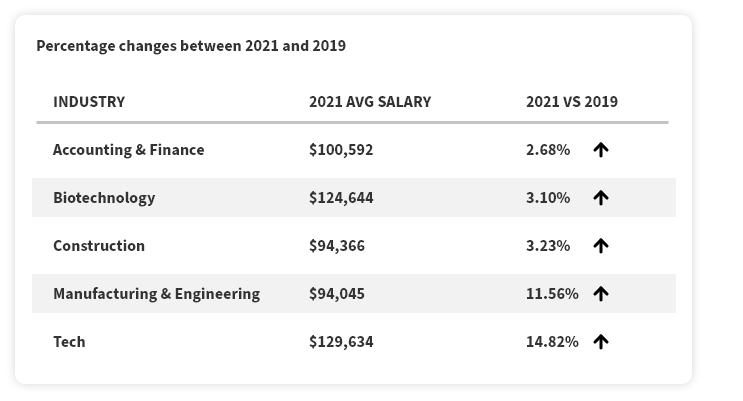2022
Workforce
& Salary Trends

Workforce Trends
Projected Industry Growth for 2022
According to the BLS, total employment in the U.S. was projected to grow 10.8% during the 2012 to 2022 decade. Some of the fastest-growing industries that largely contributed to the 15.6 million job increase were in the healthcare, construction, and personal care sectors.
However, industry forecasts and predictions have been riddled with uncertainty and more than one surprise over the last two years. Still, no one is certain what the completely post-pandemic economy and industry outlooks will be like, but here's what's been predicted.
 97 million new roles in Information Technology will be created by 2025
97 million new roles in Information Technology will be created by 2025
Information Technology
According to the Future of Jobs Report by the World Economic Forum, 97 million new roles in Information Technology will be created by 2025. Several sources report the IT industry's biggest challenge continues to be finding qualified candidates to fill their roles, and this challenge is not projected to end any time soon. According to latest figures from IT employment consultancy Janco Associates, "Finding web developers and cybersecurity and compliance pros remains the toughest task for CIOs — and is causing HR to focus more on IT staff retention." So, if you're a skilled tech professional, finding a new job opportunity to meet all your needs has never been better. On the other hand, a continued lack of qualified candidates will most likely mean stunted growth for the IT industry overall, but only time will tell.
Construction
A report on construction in the U.S. focusing on key trends and opportunities for growth from 2021 to 2025 cited that the U.S. construction industry to grow by 1.8% in 2021. It is projected to grow by 3.1% in 2022 before it moderates to annual average growth of 2.2% over the remainder of the forecast period. It's important to note that 2021 lower growth percentages can be attributed to ongoing supply chain issues, including shortages of skilled labor and building materials, which have caused project delays and added building costs for new homes. The same report explains, "Permits for future home construction are currently running ahead of housing starts, suggesting moderate gains in homebuilding activity in the quarters ahead." According to Statista, the shortages in skilled labor and building materials are a challenge that is impacting construction costs.
Finance & Accounting
"From banking and capital markets to insurance to investment management to commercial real estate, financial services firms face in 2022 a pivotal, no-turning-back opportunity to shape their—and the industry's—future." Every aspect of the finance industry is facing inflection points around the issues of talent, technology, risk and purpose, according to Deloitte's Center for Financial Services 2022 Outlook. In terms of percentage growth for the finance sector in 2022, it's hard to say. With so many deciding factors imminently waiting to be made, anything can happen in the short-term. In the long-term, job outlook for the next 10 years is mixed. The BLS predicts that the employment for positions like Financial Managers will grow by 17% from 2020 to 2030, which is much higher than the 8% growth rate for all occupations during this period. Additionally, positions like Accountants and Auditors are expected to grow only 7% in the same time frame.
Of course, we can't talk about projected industry employment trends without mentioning the record number resignations happening daily, not only in the U.S. but throughout the world.
The World's Workforce Continues to Resign in Record Numbers
Before the pandemic, it was common for workers to adapt their lifestyles to the circumstances of their jobs. Fast forward to 2022 where the roles are reversed: workers are seeking companies that are open to working around their lifestyles.
 Employees recognized when it was time to level up their opportunities
Employees recognized when it was time to level up their opportunities
The Breaking Point
Many workers were interested in switching careers long before Covid-19 arrived. The pandemic put the dreams of millions of Americans on hold. Some of the contributing factors for workers wanting to resign before the pandemic included a reduction in benefits, a decline in work-life balance, or a toxic company culture. The motivations behind their reasons for wanting to quit only grew stronger as they watched massive layoffs occur.
Onwards & Upwards: A Time to Get Inspired
Even in the face of difficulty, employees recognized when it was time to level up their opportunities. Workers began to rethink their priorities, whether that was pursuing a dream job or becoming a stay-at-home parent. Meanwhile, others nurtured their skills and interests in hopes that they could incorporate these learnings into their day-to-day life.

A Shift Across Industries
Over the last few months, the words, "I quit" were spoken to one employer after another. "How to resign" became a trending topic across industries like hospitality, tech, healthcare, and especially retail. As Daniel Zhao, a labor economist with Glassdoor said, "We haven't seen anything quite like the situation we have today." With so many workers in pursuit of their next chapter, this has put the job market in a vulnerable position — especially since the roles workers left were never filled.
The most frequent resignations are found among mid-career workers.
Ages 36-40
19.6%
Increase  In Resignations
In Resignations
Ages 41-45
25.1%
Increase  In Resignations
In Resignations
Ages 20-25
20.3%
Decrease  In Resignations
In Resignations
The technology, healthcare, and retail industries are seeing the most resignations.
Technology
4.5%
Increase  In Resignations
Between March '20-'21
Source: Forbes
In Resignations
Between March '20-'21
Source: Forbes
Healthcare
3.61%
Increase  In Resignations
Between March '20-'21
In Resignations
Between March '20-'21
Retail
650,000
Retail Workers Quit
In April 2021
Source: BBC
More managers have resigned as a result of the pandemic.
More women exited the workforce, often to take care of their families, while men moved to different roles.
The Recruiting Challenge
A recent report studying the Federal Pandemic Unemployment Compensation shows that a 10% increase in unemployment benefits resulted in a 3.6% decrease in job applications. While a 3.6% increase in applications could possibly solve hiring dilemmas, human resource departments are weighing out the pros and cons of today's job market. Factors like commuting, cost-of-living adjustments (COLA), and Covid safety protocols are all part of the conversation.
Why the "Great Resignation" or the "Great Reshuffle" Matters
As millions of Americans transitioned to working from home last year, they recognized the takeaway of that experience: an increase in their quality of life. Realizing the benefit of this, many workers refuse to settle for less than a hybrid working model.
With millions of workers quitting, how will companies adapt to meet their needs? Only time will tell what the job market has in store for those looking to hire and be hired. What we do know is that companies are getting competitive with their hiring incentives to win the best talent on the market, and here's how...
The Top Hiring Incentives that Win Job Seekers
After one of the most difficult years in our nation's recent history, things are looking up as the economy improves. The even better news for job seekers? Employers are struggling to fill jobs, and many are getting creative in their efforts to attract and retain talent.
It's a win-win. Applicants find themselves in a rare position of power, and companies are realizing they can hook job seekers with a one-time cost rather than paying higher salaries or enhancing traditional benefits long-term. It's also in companies' best interest to prevent attrition, as it can cost thousands of dollars to search for, train, and replace a full-time employee.
People are searching for job posts mentioning hiring incentives 134% more than they were at the beginning of 2021, and listings offering signing and retention bonuses, or cash incentives are twice as common now than they were a year ago.
Whether it's because of jobless benefits, ongoing health worries, or the need to care for family members, many workers have left the job market, meaning certain workers may be in demand more now than ever before in their careers. That is if they're in the right industry and know what their potential employer is willing to offer to get them to join their team.
 People searched for jobs with hiring incentives 134% more than in 2020
People searched for jobs with hiring incentives 134% more than in 2020
Cash Bonuses and Where to Find Them
Indeed is reporting that during a seven-day period in June of this year, 16% of its driving-related job postings advertised signing bonuses. Delivery drivers are taking the bait, and long-haul truckers are doing even better.
Meanwhile, postings in the personal care and home health sector jumped from 5.9% to 9.1% during that same time frame compared to earlier in the year. Those looking for nursing jobs encountered incentives ranging from $100 to $30,000. And there were incentives between $100 and $2,500 in the food preparation and service industry.
Top Non-Monetary Incentives
 Childcare is a big draw for prospective hires. Working parents have always considered childcare a challenge, and for that reason, many have been reluctant to return to the office after the pandemic. Some employers have started to offer childcare subsidies. According to SHRM, employers that supply child care subsidies can qualify for an annual tax credit of up to $150,000 if they use it for qualified child care facilities and services. Other childcare related benefits gaining traction include more personal days, tutoring stipends, and on-site childcare facilities.
Childcare is a big draw for prospective hires. Working parents have always considered childcare a challenge, and for that reason, many have been reluctant to return to the office after the pandemic. Some employers have started to offer childcare subsidies. According to SHRM, employers that supply child care subsidies can qualify for an annual tax credit of up to $150,000 if they use it for qualified child care facilities and services. Other childcare related benefits gaining traction include more personal days, tutoring stipends, and on-site childcare facilities.
 Work from home and flextime are two other ways businesses are trying to capture candidates' attention. Those include not only unlimited paid time off but also the option to choose temporary or contract work over full-time. Many new employees are even able to arrange nontraditional work hours to accommodate their other life demands.
Work from home and flextime are two other ways businesses are trying to capture candidates' attention. Those include not only unlimited paid time off but also the option to choose temporary or contract work over full-time. Many new employees are even able to arrange nontraditional work hours to accommodate their other life demands.
 Tuition reimbursement for employees and their spouses and children can help workers earn bachelor's and associate degrees or gain technical skills and knowledge from certificate programs. For example, Amazon's Career Choice program prepays up to 95% of tuition and fees for employees who earn a degree or certificate. If you're interested in what other top companies are now offering a reimbursement list, check out this list.
Tuition reimbursement for employees and their spouses and children can help workers earn bachelor's and associate degrees or gain technical skills and knowledge from certificate programs. For example, Amazon's Career Choice program prepays up to 95% of tuition and fees for employees who earn a degree or certificate. If you're interested in what other top companies are now offering a reimbursement list, check out this list.
Going Beyond Incentives
Large, well-known companies obviously have the edge when it comes to big-ticket hiring incentives. But we encourage you to do your research while job seeking, and if you're able to snag one of these great incentives, go for it! Just keep the full package in mind. Weighing all job factors according to your biggest priorities will help to ensure your future happiness and job satisfaction.
What are Companies Doing to Retain Skilled Talent?
 94% of employees stay with a company longer if it invested in their career
94% of employees stay with a company longer if it invested in their career
Professional and Career Development
A LinkedIn Survey found that 94% of employees would stay with a company longer if it invested in their career, and companies are listening. The interest in learning and development is particularly prevalent among younger employees. "LinkedIn's research found that roughly a quarter of Gen Z and Millennials say learning is the number one thing that makes them happy at work, and over a quarter (27 percent) of Gen Z and Millennials say the number one reason they'd leave their job is because they did not have the opportunity to learn and grow."
Employers are also promoting cross-functional training and internal transfer opportunities. While internal transfers may result in the need for the company to backfill a position on a different team, this ultimately helps companies save on external recruiting costs.
Competitive Salary, Benefits and Perks
According to our recruiters, nearly 90% of employers are responding to the competitive market for skilled talent by increasing base salaries. The dramatic increase in average compensation due to the high demand and limited supply of experienced professionals has made it more challenging for startups and smaller companies to win talent. 66% of companies are offering hiring incentives such as sign on bonuses, retention bonuses and cash incentives. More than half of companies are offering equity, the ability to work fully remotely, or flextime. 43% of companies are improving bonus structures. Less common perks include 100% paid benefits for individuals and dependents as well as quarterly adjustments in base salary/hourly wage to combat inflation. Additionally, 76% of employers are increasing salaries and 31% are awarding stock options. Other creative benefits employers have been offering are the ability to cash out vacation hours, improved benefits namely health care and PTO, and employee perks such as providing a stipend for work from home costs. Employers may be downsizing or subleasing their physical office space, and employees are expecting companies to invest these funds back into their employees.
Shared Values and Culture Fit
Whether a company has commitments to sustainability, philanthropy, social impact, diversity, and inclusion, or something else, employees want to make sure their values align. A survey from Jobvite found that 32% of new employees who quit within the first 90 days of a job cite their reason for leaving as a dissatisfaction with the company culture.
Remote Work & Flexible Scheduling
As hybrid work environments become more prevalent, almost 80% of employers are offering work from home options. We asked candidates what they prefer and found that 55% prefer a 100% remote work environment, 32% prefer to go into the office 1-2 days a week, 9% prefer to go into the office 3-4 days a week, and only 4% would like to return to the office 100% full-time. If employers are not willing to offer 100% remote work as an option, they are most likely going to experience high employee turnover and miss out on the best talent to backfill those positions. To put the nail in the coffin, check out our graph below to see the percentage of fully remote jobs from the beginning of 2019 to the end of 2021.
A Remote Work Revolution
It's no secret that flexible, hybrid, or remote work arrangements have become regular expectations for many job seekers. A 2021 study conducted by Bloomberg revealed that 39% of workers would consider quitting if their employers weren't flexible about remote work. That percentage is even higher among Millennial and Generation Z workers.

Opportunities
Although flexible work arrangements have become a demand for many employees, we can't ignore the fact that various studies have shown remote work offers numerous benefits to employers as well:
- Ability to hire from a wider pool of candidates
- Boosted productivity
- Better performance
- Happier and healthier employees
- Higher employee retention rates
- Lower operating costs
Top Interview Questions for 2022
- Where do you see yourself in 5 years? Are you looking to go into a leadership role, or would you rather be a strong individual contributor?
- What are you looking for at your next company?
- What do you look for in a manager? What would your manager need to do to best support your success?
- What aspects of team culture appeal to you? Do you prefer to work more collaboratively or independently?
- What motivates you to do your best work?
- How do you define success both personally and professionally?
- What is your biggest career accomplishment?
- Give me an example of a time you faced a conflict while working on a team. How did you handle that?
- Tell me about a time you were under a lot of pressure. What was going on, and how did you get through it?
- Describe a long-term project that you managed. How did you keep everything moving along in a timely manner?
We would also like to note that by the interview stage of the hiring process, many employers are now typically focusing on behavioral and company culture fit questions, rather than questioning skills and experience. This even applies to more technical roles where certain skills are key to the success of a job.
Questions that May No Longer be Important or Relevant in 2022
- Why are you leaving your current role?
- Why is there a gap in your resume?
- Are you within commuting distance of our local office?
- What is your greatest weakness?
In the technology industry, we're seeing candidates declining jobs at the code review phase. Top tech candidates are happy to discuss technical questions during a call or interview but aren't willing to spend hours on code reviews, especially if they're already gainfully employed.
Other Insights
Our recruiters are seeing employers inquiring about vaccination status. This is a popular and ever-changing topic. Any hiring manager or candidate should anticipate these questions coming up and be prepared to answer them.
Salary Increases and Decreases

We gathered salary data based on thousands of job placements we've made since 2019 to help you better understand the changes you can expect to see to salaries in your industry in 2022.
If you'd like to find out if you could be making more money with your current job title in the same or even a different location, check out CyberCoders' 2022 Salary Guide. You can also use this information to your advantage to make the most informed applying, interviewing, offer acceptance decisions based on data compiled from thousands of salary surveys.
It's important to note that your salary is directly impacted by your job title, skills, years of experience, and job location, among other factors. We encourage you to keep reading to learn about the economic factors that have most likely contributed to the growth or decline of your salary in recent years.
Economic Factors that Impact Salary
If the past year has taught us anything, it's that the world around us can have some unpredictable effects on the things we rely on—especially our compensation. Markets rise and fall, and even the most prescient economist will admit to being surprised now and then.
However, there are a few market factors and trends that reliably determine how your pay might be affected, how other job seekers' compensation matches up, and whether your salary will be secure in the coming months.
 There are a few market factors and trends that determine your pay
There are a few market factors and trends that determine your pay
Location
Are you a suburbanite or a city dweller? Do you drive a car to work or take mass transit? How fancy is your kids' school? If the cost of living where you live and work is higher than in other areas, then employers in those locales are probably paying higher salaries in order to attract and retain talent. That's true for earners at all wage levels, from the valet parker to the exec who trusts him with her Mercedes.
What's more, a recent geographic pay policies study found that 55% of companies set pay differences based on location. And half of the employees surveyed said they'd move in response to a change in their salary, either up or down.
For many of us, returning to the office is still simply not an option. If that was true for you this year and you were able to continue your job remotely, then your salary prospects may have depended on where you were and what industry you're in. As we pointed out recently, some tech workers who chose to do their job remotely in a non-tech hub like Austin or Massachusetts took a 15% decrease in their salary and equity awards.
Labor Shortages
We've all heard about the supply chain crisis and how it's about to play Grinch with our holiday purchasing plans. Well, shortages in goods are often linked to shortages in labor as companies hedge their hiring bets on being able to keep prices low.
This year, workers have been quitting en masse either because they're burnt out from low pay and high stress or because they're optimistic about finding even greener pastures elsewhere. 79% of surveyed employers say they've been having trouble hiring recently, with 76% saying their business is suffering as a result. Across businesses of all sizes, 91% of managers and executives have had to do some of the hands-on work themselves in order to get by.
Could compensation go up once products start flowing better? President Biden implied as much when he said, "Instead of workers competing with each other for jobs that are scarce, employers are competing with each other to attract workers."
Inflation
When there's more money and credit than goods and services, inflation happens. While that means your dollar buys less, it also usually means employers must pay more so their workers can afford things.
Right now, wages are rising faster than the rate of inflation, which is a positive. In September, wages rose by 1.2 percentage points while consumer prices went up only 0.4%. The year-over-year increase is 5.4%, but don't panic if you don't receive a raise to match that.
Experts maintain that inflation hits individuals differently. While home basics like food and energy jumped 0.9% and 1.3% respectively in September, the highest increases were in areas like used vehicles (20% higher than a year ago) and gasoline (up 42% in the past year). That means if you didn't buy a used car or take a trip that would be impacted by higher fuel prices, then you won't feel the effects of inflation as heavily.
The economy and the job market are constantly shifting and evolving, presenting job seekers with opportunities and dilemmas almost every day. How well you stay on top of market trends may make all the difference in your future compensation.
We hope this 2022 Workforce and Salary Trends Report will help you better navigate the job market whether you're a job seeker or looking to build your team. Regardless, we'll be here to help.











 Childcare is a big draw for prospective hires. Working parents have always considered childcare a challenge, and for that reason, many have been reluctant to return to the office after the pandemic. Some employers have started to offer childcare subsidies. According to
Childcare is a big draw for prospective hires. Working parents have always considered childcare a challenge, and for that reason, many have been reluctant to return to the office after the pandemic. Some employers have started to offer childcare subsidies. According to  Work from home and flextime are two other ways businesses are trying to capture candidates' attention. Those include not only unlimited paid time off but also the option to choose temporary or contract work over full-time. Many new employees are even able to arrange nontraditional work hours to accommodate their other life demands.
Work from home and flextime are two other ways businesses are trying to capture candidates' attention. Those include not only unlimited paid time off but also the option to choose temporary or contract work over full-time. Many new employees are even able to arrange nontraditional work hours to accommodate their other life demands. Tuition reimbursement for employees and their spouses and children can help workers earn bachelor's and associate degrees or gain technical skills and knowledge from certificate programs. For example,
Tuition reimbursement for employees and their spouses and children can help workers earn bachelor's and associate degrees or gain technical skills and knowledge from certificate programs. For example, 



